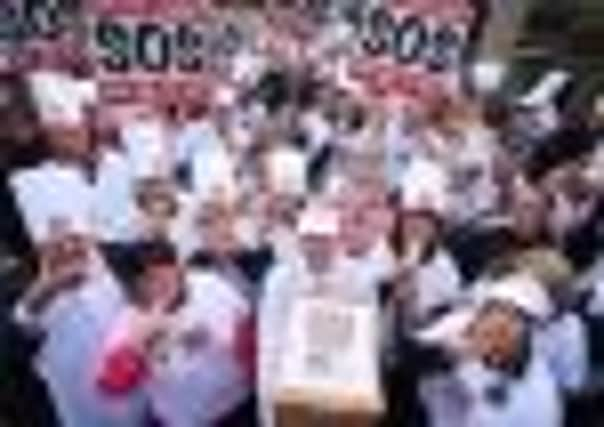Treasury performs U-turn on George Osborne’s pasty tax


It also left the Prime Minister and Chancellor facing ridicule. George Osborne was challenged at a Treasury committee to reveal when he last ate a pasty. The same question was levelled at David Cameron, who was left red-faced after it was revealed the shop from which claimed to have bought one had been closed for five years.
The government is also dropping plans to increase tax on static caravans to the full 20 per cent – a move that angered some Conservatives, who saw it as hitting their core voters.
Advertisement
Hide AdAdvertisement
Hide AdThe Treasury tonight revealed revised proposals, under which VAT is expected only to be charged on food intended to be served hot. That omits food such as pasties, which is left to cool in cabinets before being served.


At present, VAT is not charged on most food and drink, or hot baked goods, but is payable on takeaway food sold to be eaten hot. However, hot savouries, including pasties and pies, are exempt. The U-turn would effectively maintain this situation.
Consultations ended on 18 May and Treasury sources said last night the change was about “implementation” and aimed at closing the gaps in the VAT system dealing with unfair anomalies.
A Treasury source said: “We rightly consulted, listened and are glad we have a solution that is fair.”
A spokesman for the Treasury said: “The Budget announced a consultation on a change to VAT on hot takeaway food, designed to remove inconsistency and ambiguity in the system and level the playing field across the takeaway food market.


“After extensive engagement, we have improved the policy, addressing practical concerns and ensuring that the new regime could be as simple as possible to apply.
“We have addressed these in a way that allows us to remove the inconsistent VAT treatment, while not imposing any additional requirement on businesses to test the temperature of their products.”
The measures were meant to be part of a simplification of the VAT system but provoked a storm of controversy.
Advertisement
Hide AdAdvertisement
Hide AdIt came amid claims by former Tory leadership candidate David Davis that the government was out of touch, while Conservative backbencher Nadine Dorries said it was dominated by posh boys “who don’t know the price of milk”.
Under the new proposals, VAT will be charged on all food provided hot for the purposes of allowing it to be eaten hot, or food which is cooked hot to order.
VAT will also apply where food is kept hot in cabinets, on hot plates, or under heat lamps, or where heat is applied in order to slow the cooling process.
It will also apply where food is provided in heat-retaining packaging or other packaging specifically designed for hot food – an example would be foil-lined takeaway packaging for Indian and Chinese takeaways.
Food advertised as hot is also subject to VAT.
On static caravans, a 5 per cent rate is being introduced to acknowledge the uncertain boundary between residential and non-residential caravans.
The VAT changes for static caravans will also be delayed from October to April 2013.
Cornish MP George Eustice welcomed the move on the pasty tax. He said: “This is great news for the Cornish pasty industry and resolves all of the problems that had been raised .
“The government has run a genuine consultation and now there is an improved proposal as a result. The Treasury should be given credit for the way they have approached the issue.”
Advertisement
Hide AdAdvertisement
Hide AdTory MP Graham Stuart, who organised a petition of Parliament by more than 25 MPs, welcomed the move on the caravan tax. He said: “We are delighted. It is a victory for the campaign to persuade the government to think again.
“Many backbenchers and, privately, ministers behind the scenes talked to the government and we were successful in persuading them to review the original decision.
“It is great news for the manufacturing industry and also for the park and coastal communities all around the country.”
Mr Stuart said he was happy with the compromise, acknowledging the state of the economy and the need to raise revenue.
Liberal Democrat MP Stephen Gilbert welcomed the pasty tax move after tabling an early day motion and raising the issue at Prime Minister’s Questions.
He said: “The Cornish people have won and there will be dancing in streets from Land’s End to the Tamar, as people hear that the government has dropped their plans to clobber local people and local businesses with this tax.”
The government had faced unrest on its own benches over the proposals on closing VAT loopholes.
In a Commons vote on the pasty tax proposals, 14 coalition MPs – nine Tories and five Liberal Democrats – rebelled against the government in an unsuccessful attempt to strip it from the Budget.
The caravan tax provoked a bigger rebellion of 18 coalition MPs, including 17 Tories.